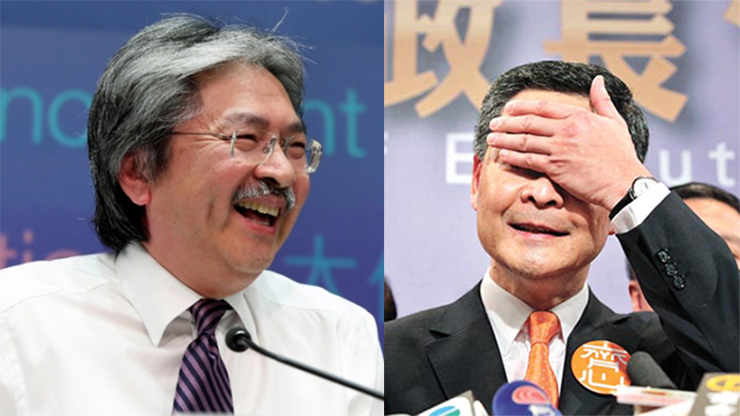Finance Secretary John Tsang Chun-wah mouths a few platitudes about the violence that shook Mong Kok earlier this month… and suddenly he is anointed by pan-democrats as the city’s next chief executive.
Meanwhile, for the ninth straight year, Tsang delivered a budget almost entirely devoid of new ideas. This year’s blueprint is the usual tired mix of allocation and appeasement. It comes at a time when the city is crying out for imagination and innovation to address growing socioeconomic problems perennially ignored by Tsang’s “sugar-coated” tinkering.

These problems—a wealth gap that belongs in the third world, a poverty rate approaching 20 percent, inadequate social security, the absence of a viable pension plan and more—will only become more pronounced in the coming years. Indeed, they were no doubt contributing factors in the Mong Kok riot decried by Tsang in his budget speech.
Young people in Hong Kong look into the future and see formidable obstacles and dwindling opportunities. Tsang’s HK$38.8 billion offering of one-off tax concessions and other sweeteners does nothing to alleviate these.
The 75 percent reduction in salaries tax (up to a maximum of HK$20,000) will not benefit the 60 percent of Hong Kong’s 7.2 million population paying no tax because they don’t earn enough income to qualify. And for many of this increasingly unhappy and vocal majority living on the city’s economic margins, there is a cruel Catch-22: As income earners, they also do not qualify for Comprehensive Social Security Assistance (CSSA).
These are the same people who cannot even dream of owning a home in Hong Kong’s astronomically priced housing market and so do not benefit from the rate waivers Tsang once again handed out. Low-income earners were actually on the losing end of this year’s budget, in which the finance chief took back one of last year’s sweeteners—one rent-free month in public housing.

Tsang’s budget treatment of another shamefully neglected group—the elderly, a distressing third of whom live below the poverty line—is typical of his short-sighted, short-term approach to Hong Kong’s fiscal challenges.
According to the Census and Statistics Department, the number of people aged 65 or over, currently 15 percent of Hong Kong’s population, will double by 2034 and rise to 36 percent 30 years later.
Tsang’s answer to this huge question mark hanging over the city’s financial future: an extra month of CSSA handouts, 160 more beds in elderly care centres and a pilot “Silver Bond” scheme for old people that many of them cannot afford to join.
That sounds more like a joke than an answer.

It doesn’t take a finance whiz to add up the hundreds of billions of dollars in surpluses accumulated during the Tsang years and then to realise that today Hong Kong could and should have in place a workable pension plan that would allow its ageing population to grow old in comfort and dignity.
Instead, we have care centres where the elderly are often neglected or even abused, and streets are combed by geriatric collectors of recyclable cardboard and plastic hoping to add to their meagre savings.
Labour Party lawmaker Fernando Cheung Chiu-hung, one pan-democrat not beguiled by Tsang’s rhetoric last Wednesday, took the time to crunch the numbers in this year’s budget and found a 6:1 ratio between measures that benefit business and industry and spending for the grassroots.
“It is even more biased towards industry in comparison to previous reports,” Cheung said.
Ironically, although Tsang spoke the language of understanding and reconciliation, his figures tell the same old story of indifference and division.
“The people of this city, our younger generations in particular, are hungering for spiritual contentment,” Tsang said at one point, adding that the government needs to address Hong Kong’s generational divide.
This was a refreshing change of tone and substance from Chief Executive Leung Chun-ying’s policy address last month—which failed to mention any of Hong Kong’s most pressing problems but rather became a platform to sell Beijing’s “One Belt, One Road” initiative—and struck many observers as a clear signal of Tsang’s desire to replace his boss in 2017.
Also in contrast to Leung, Tsang spoke of his personal reaction to the Mong Kok chaos, saying:
“I was perplexed as to why violence had flared in Hong Kong. I was shocked that our city could have turned overnight into such a strange and alien place that I hardly recognised. I was troubled why the core values that we long cherished had been devoured by violence and hatred.”

If the words were genuine and heartfelt, they were also terribly naive coming from the man who supposedly has had his finger on Hong Kong’s economic pulse for nearly a decade and thus should be intimately acquainted with the economic factors causing such disaffection and anger.
Yes, Mong Kok was shocking, but its fury and destructiveness were not built up over only one night and its lessons should not seem strange or alien.
For years, this city has been boiling with disadvantage and discontent born of a toxic mix of declining economic mobility and an unrepresentative government that speaks for the central authorities in Beijing rather than the people of Hong Kong.
Mong Kok was just a particularly ugly symptom of a sickness that will continue to afflict Hong Kong.
With his oratory last week, the financial secretary may have won some support for a possible bid to be the city’s next chief executive. Certainly, he struck a tone and posture that stood in agreeable contrast to the wooden, uncompromising Leung.
His budget, however, does nothing to redress the problems that moved him to speak.
